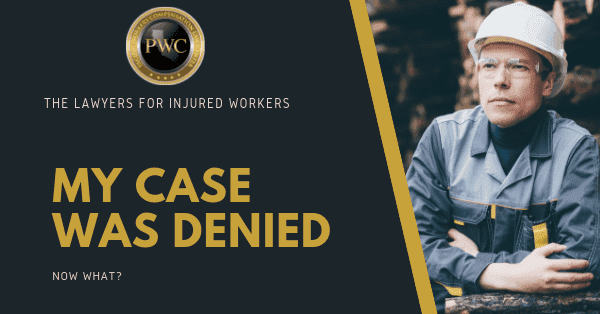Oakland Denied Workers Compensation Claim Lawyers
Was Your Workers' Comp Claim Denied? We Can Help!
If you were recently injured on the job, you may have filed a workers’ compensation claim and expected a favorable outcome. Unfortunately, just because you filed a claim does not necessarily mean it will be accepted. The Division of Workers’ Compensation (DWC) in California can deny your claim for a variety of reasons. The good news? You have the right to appeal their decision.
Before you make an appeal, however, it is helpful to know why your claim was denied. At Pacific Workers', The Lawyers for Injured Workers, we carefully assess each case and create an informed strategy based on our findings. Rather than blindly moving forward, our clients can count on calculated efforts every step of the way.
Fill out a free case evaluation form to tell our Oakland workers’ compensation attorneys more about your case!
Common Reasons for Claim Denials
A claim denial indicates that the claims administrator did not believe your work injury should be covered by workers’ compensation. You will be alerted of the denial by letter, at which point you have the opportunity to challenge the decision.
A claim can be denied for any number of reasons, including:
- Failure to report or file the claim on time
- The employer disputes the claim
- Injuries are not severe enough to warrant a claim
- Injuries were caused by stress, not work-related conditions
If you want to object to the denial of your claim, you must file both an Application for Adjudication of Claim and a Declaration of Readiness to Proceed. These documents indicate that you want your case heard by a judge. After a hearing and a trial, a decision is made about your case.
CAN YOU GET WORKERS' COMP IF YOU ARE AN INDEPENDENT CONTACTOR?
According to California labor laws, independent contractors are not eligible for Workers' Compensation through their employer, and are, in fact, responsible for their own Workers' Compensation insurance. However, that doesn't mean that you can't receive Workers' Compensation if you are an independent contractor. While that might seem like a contradiction, there's actually a very simple explanation: many people who are classified as independent contractors are really employees.
Misclassification is a common problem, rampant in industries like trucking. Countless businesses in the state and around the country misclassify part-time, or even full-time, employees as contractors in order to save money on benefits, social security, Workers' Compensation insurance, and payroll taxes. This is illegal, and there are penalties from the labor board and from civil court. Employees who have been misclassified as independent contractors are eligible for Workers' Compensation benefits, and are entitled to treatment when they get hurt.
Workers' Compensation cases involving misclassification are more complicated than average. There must be a trial at the Workers' Compensation Board to prove that the injured worker is really an employee.
There are many factors that go into proving employment status, the most crucial of which are:
- Does the employer provide the equipment necessary to do the job?
- Does the employer set the workers' schedule and tell them when & where to work?
If the answer to both of those questions is, "yes," you're most likely an employee, regardless of what kind of tax form you filled out, and an experienced Workers' Compensation attorney can easily prove the truth and get you the benefits that you deserve. However, there are some sectors in which labor law is still catching up with technology. For an example, the classification of Uber drivers is currently a gray area being worked out in the courts. But in most cases, the law is clear: injured workers who have been misclassified as independent contractors can receive Workers' Compensation.


What Happens If My Case is Denied?
It can be the worst feeling in the world: You got hurt at work, made sure to dot the I’s and cross the t’s when you filed your DWC-1 form, then took some much needed time to recover, only to be turned down by the insurance company. Receiving notice that your claim was denied — when your injury happened at work and you know the pain is real — can be frustrating, disheartening, or downright terrifying. Thankfully this denial letter isn’t the end of the road.
- Keep Treating Your Injuries: Medical bills can be difficult to keep up with without the aid of workers’ compensation, but it’s important that you do everything you can to address your injuries. This means sticking to prescribed medication regimens and going to follow up visits with doctors and therapists. Failing to do so can hurt you in two ways: Your injury may get worse, and you are giving the insurance agency more ammunition to poke holes in your claim.
- Who Can You Call? Don’t let a denied claim cast doubt on your injuries. Insurance companies deny valid claims all the time, knowing that most workers won’t fight back. But an experienced California workers’ compensation attorney can guide you through the complex legal process to force the insurers to accept your right to compensation.

- Workers’ Compensation Appeals Board (WCAB), Qualified Medical Examiner and Agreed Medical Examiner: The next steps illustrate the need for an experienced lawyer. Depending on the reasons your claim was denied, different legal approaches will be required. If the insurance company disputed some crucial fact to your case, such as whether you’re an employee, you’ll need to have a hearing before the Workers’ Compensation Appeals Board (WCAB). If the cause of your injury is what’s in question, you will need to see a qualified medical evaluator (QME) or an agreed medical examiner (AME) evaluate your claim.
Retain an Oakland Workers’ Compensation Lawyer
Before the appeals process, you have the right to obtain legal representation. We cannot emphasize enough how important this is – the attorney you choose can have an immense impact on the outcome of your case. Our firm is here to give you the best possible chance at a favorable decision and with 130+ years of experience, you can feel confident when we’re on your side.
Don’t wait! Your claim is bound by time constraints and should be handled proactively. Get in touch with Pacific Workers', The Lawyers for Injured Workers today. Offices in Oakland and Concord!

We have Helped OVER 12,000 CLIENTS aND WE CAN HELP YOU TOO!
-
They care, and they help injured workers!
“
They care, and they help injured workers!
”Darnell Hester
-
I'll recommend him always.
“I'll recommend him always.”
Bernadette L Mixon
-
Thank you again to everyone at Pacific Workers’ Compensation!
“Thank you again to everyone at Pacific Workers’ Compensation!”
Johnny
-
Communication is extremely important, and that has been A+ since the beginning!
“
Communication is extremely important, and that has been A+ since the beginning!
”Brandon Colbert
-
Highly Recommend Pacific Workers’ Lawyers
“Highly Recommend Pacific Workers’ Lawyers”
Asif Chashmawala
-
They didn't give up on me.
“Pacific Workers went to bat for me. Was I an easy person to get along with, no but they didn’t give up on me.”
David W.
-
Thank you for being so kind!
“I started my fight against my company's workers comp and after talking to Almarie for the first time I already felt a lot of weight off my shoulders.”
Jazzie D. Daly City, CA
Proudly Serving Northern California

Workers' Comp FAQ
-
What If My Employer Denies My Workers’ Compensation Claim Because I’m a Seasonal Worker?
Employers in California are legally required to provide workers' compensation coverage to all employees, including seasonal workers. If your claim is denied, it's advisable to consult with a workers' compensation attorney to understand your rights and explore options for appealing the decision.
-
Do independent contractors get workers’ compensation in California?
No, most independent contractors are not covered by workers’ compensation insurance that is provided by their employer. The law does not require most employers to offer this sort of employment benefit to independent contractors. To get workers’ comp as an independent contractor, you will usually have to purchase a policy on your own.
-
Am I Eligible for Workers’ Compensation?
In California, all employees are eligible for workers’ compensation with very few exceptions. If you are classified as an “employee” (rather than an “independent contractor”), you are eligible to receive benefits. This is true regardless of how many employees your employer has, how many hours you work, how much you make, whether you work part-time or full-time, or whether you are a seasonal worker. Additionally, undocumented workers are also eligible for workers’ compensation granted they meet all other eligibility requirements. In contrast, independent contractors and certain other workers, including some volunteers, household workers who are employed by a family member, and others, are not able to file for workers’ compensation benefits.
-
My Employer Said That I’m an Independent Contractor, Not a Regular Employee, so I Can’t Get Benefits. Is This True?
You’re not necessarily an independent contractor by law if the nature of your job doesn’t fit the description, an attorney may help analyze your situation and guide you in this matter. There are high chances of contractors being eligible for workers’ compensation benefits, so it’s always worth trying.
-
What benefits can I seek with a workers' compensation claim in Oakland?In California, if you've been injured at work or diagnosed with a work-related illness, you can file a workers' compensation claim to seek benefits that cover a range of expenses. These benefits include medical costs, lost wages due to time off work, compensation for future earnings if you're unable to return to work, and expenses related to retraining or skill enhancement if you need to switch professions. Given Oakland's high cost of living, it's important to ensure your claim is accurately filed to receive all the benefits you're entitled to.















